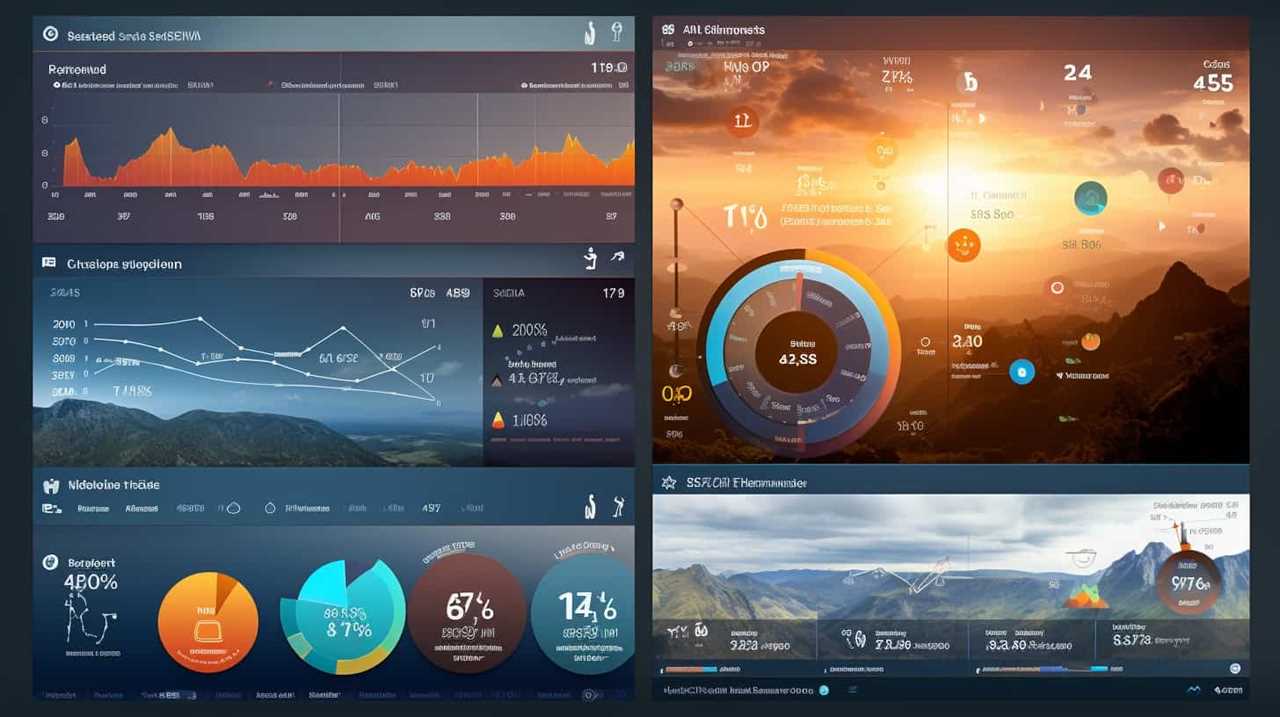Are you ready to uncover the secret approach to achieving skyrocketing rankings in search engines?
We’ve got the answer: quality content. Yes, you heard it right.
When we focus on delivering top-notch, valuable information that captivates and engages our audience, our search engine results page (SERP) ranking soars.
But how exactly does this work? In this article, we’ll dive deep into the world of quality content and explore how it elevates our SERP ranking, bringing us closer to the liberation we desire.

Key Takeaways
- Quality content improves search engine rankings and increases the chances of appearing higher in search engine results.
- User engagement metrics, such as click-through rates (CTR) and dwell time, are important factors for SERP ranking.
- Captivating headlines and relevant content reduce bounce rates and improve click-through rates.
- Building backlinks and leveraging social media signals contribute to the website’s SERP ranking and authority.
Relevance of Quality Content
In our experience, quality content has consistently proven its relevance in elevating SERP rankings over time. When it comes to content relevance, search engines prioritize websites that provide valuable and informative content to users. This means that the content on your website needs to be directly related to the search queries users are making.
By creating high-quality content that’s relevant to your target audience, you can increase the chances of your website appearing higher in search engine results. Additionally, user satisfaction plays a crucial role in determining SERP rankings. When users find your content helpful, engaging, and easy to navigate, they’re more likely to spend time on your website, reducing bounce rates and increasing user engagement metrics.
Therefore, focusing on content relevance and user satisfaction is key to improving your SERP rankings and attracting organic traffic to your website.
User Engagement and SERP Ranking
When it comes to user engagement and SERP ranking, two important factors to consider are click-through rates (CTR) and dwell time.

CTR measures how often users click on a search result, indicating its relevance and appeal.
Dwell time, on the other hand, measures how long users stay on a webpage after clicking on a result, indicating the quality and usefulness of the content.
Both these factors play a crucial role in determining a webpage’s ranking on search engine results pages, making user engagement an essential aspect of SEO strategy.
Click-Through Rates Impact
Our research has shown that high click-through rates significantly impact user engagement and SERP ranking. CTR optimization plays a crucial role in improving the visibility of your website on search engine result pages.

When users see your website listed among the top search results and click on it, it indicates that they find your content relevant and trustworthy. This positive user behavior is closely monitored by search engines, which then consider your website more valuable and deserving of a higher ranking.
User behavior analysis helps search engines understand the preferences of users and tailor their search results accordingly. By focusing on improving your click-through rates through compelling titles, meta descriptions, and relevant content, you can boost user engagement and ultimately enhance your SERP ranking.
Now, let’s delve into the importance of dwell time and how it affects your website’s performance.
Dwell Time Importance
To further understand the impact of user engagement on SERP ranking, let’s explore the significance of dwell time.

Dwell time refers to the amount of time a user spends on a webpage after clicking on a search result. It’s an important metric that search engines use to determine the quality and relevance of a webpage. When users spend more time on a webpage, it indicates that the content is engaging and valuable to them. This increased dwell time signals to search engines that the webpage provides relevant information and deserves a higher SERP ranking.
Therefore, optimizing dwell time is crucial for improving search engine visibility. To achieve this, focus on creating high-quality, relevant content that captivates and holds the attention of your audience, ultimately leading to longer dwell times and improved SERP rankings.
Increased Organic Traffic
When it comes to increasing organic traffic, quality content plays a crucial role. By creating high-quality and valuable content, we can boost our visibility in search engine results pages (SERPs). This means that when users search for relevant information, our content will have a higher chance of appearing and attracting their attention.
Engaging content, on the other hand, helps to keep users on our website longer, increasing the likelihood that they’ll explore more pages and further contribute to our organic traffic growth.

Quality Content Boosts Visibility
An effective way to enhance visibility and drive increased organic traffic is through the creation of quality content. When your website consistently produces high-quality content, it can greatly benefit your visibility in search engine results pages (SERPs) and attract more organic traffic.
Here’s how quality content boosts visibility:
- Improved search engine rankings: Search engines prioritize websites that offer valuable, informative, and relevant content. By creating quality content, you increase your chances of ranking higher on SERPs, making it easier for users to find your website.
- Increased conversions: Quality content helps build trust and credibility with your audience. When visitors perceive your brand as an authority in your industry, they’re more likely to convert into customers or take desired actions on your website.
- Enhanced brand reputation: Consistently publishing high-quality content establishes your brand’s reputation as a reliable source of information. This can lead to increased brand awareness and positive associations with your business.
Engaging Content Attracts Users
By creating engaging content, we attract more users and drive increased organic traffic to our website. Engaging content not only captures the attention of users but also encourages them to interact with our website, increasing user interaction and ultimately leading to higher rankings in search engine results. When users find our content relevant and valuable, they are more likely to spend time on our website, exploring different pages and engaging with our brand. This increased user interaction signals to search engines that our website provides valuable information, improving our chances of ranking higher in search results. To illustrate this point, consider the following table:
| User Interaction | Content Relevance |
|---|---|
| Increased time spent on website | Higher rankings in search results |
| Higher click-through rates | Improved visibility |
| More social shares and comments | Increased organic traffic |
As we can see, engaging content not only attracts users but also has a direct impact on our website’s visibility and organic traffic. Now, let’s explore how engaging content can also lead to a reduced bounce rate.

Reduced Bounce Rate
A lower bounce rate is a key indicator of the positive impact quality content has on our website’s SERP ranking. When users visit our website and immediately leave without exploring any further, it signals to search engines that our content isn’t engaging or relevant to their needs. By reducing the bounce rate, we can increase user retention and improve our SERP ranking.
Here are three ways quality content helps to achieve this:
- Captivating headlines: Compelling headlines grab users’ attention and encourage them to click through and explore our website further.
- Relevant and informative content: When users find valuable information that meets their needs, they’re more likely to stay on our website, reducing the bounce rate.
- Engaging visuals: Incorporating eye-catching images or videos enhances the user experience and encourages users to spend more time on our website.
Improved Click-Through Rates
Reduced bounce rates contribute to improved click-through rates, demonstrating the direct impact of quality content on our website’s SERP ranking. When users find relevant and engaging content that meets their needs, they’re more likely to click through to other pages on our website. This improved user experience signals to search engines that our website is valuable and deserving of a higher ranking in search results.
By providing high-quality content that resonates with our target audience, we not only increase the likelihood of users staying on our website, but we also boost our conversion rates. When users find value in our content, they’re more likely to take the desired action, whether that’s making a purchase, signing up for a newsletter, or contacting us for more information.

Enhanced Dwell Time
Improved click-through rates and reduced bounce rates demonstrate the direct impact of quality content on our website’s SERP ranking; now let’s delve into the enhanced dwell time that contributes to this success.
Increased time on page and content relevance play a crucial role in improving dwell time, which refers to the amount of time users spend on our website. Here are three reasons why enhanced dwell time is essential for our SERP ranking:
- Improved user experience: When users spend more time on our website, it indicates that they find our content valuable and engaging. This positive experience signals search engines that our website is worth ranking higher.
- Increased content visibility: The longer users stay on our website, the more likely they’re to explore different pages and discover more of our content. This extended exposure increases the chances of our website being indexed and ranked for relevant keywords.
- Higher authority: Search engines perceive websites with increased dwell time as more authoritative and trustworthy. This can lead to higher rankings and an improved overall online presence.
With enhanced dwell time, our website becomes more attractive to search engines, setting the stage for the next section on building backlinks with quality content.
Building Backlinks With Quality Content
Now let’s delve into how we can effectively build backlinks with quality content to further enhance our SERP ranking.

Building backlinks plays a crucial role in improving our website’s visibility and authority. One effective strategy is building relationships with other websites and content creators in our niche. By reaching out and establishing connections, we can collaborate on content creation and link-building opportunities. This not only helps us gain high-quality backlinks but also fosters a sense of community and support within our industry.
Additionally, content promotion is essential for attracting attention and generating backlinks. Sharing our content through social media, email marketing, and guest blogging can help increase its visibility and encourage others to link back to our website.
Social Media Signals and SERP Ranking
To understand the impact of social media signals on SERP ranking, we can explore how engaging with our audience through platforms like Facebook and Twitter can positively influence our website’s visibility and authority. Social media marketing and content promotion play crucial roles in boosting our website’s search engine rankings.
Here are three ways social media signals can impact SERP ranking:

- Increased visibility: When we share our content on social media platforms, it reaches a wider audience and increases the chances of it being discovered and shared. This leads to more backlinks and higher organic traffic, which ultimately improves our SERP ranking.
- Enhanced authority: Engaging with our audience on social media helps build trust and credibility. When people engage with our content, comment, and share it, search engines view our website as an authoritative source, leading to higher rankings.
- Improved click-through rates (CTR): Social media signals like likes, shares, and comments can positively impact our click-through rates. When our content is shared and discussed on social media, it generates curiosity and interest, leading to more clicks and higher organic rankings.
By leveraging social media signals, we can significantly improve our SERP ranking and establish ourselves as a trusted and authoritative source in our industry.
Now, let’s delve into the next section about ‘establishing topical authority’.
Establishing Topical Authority
Engaging with our audience on social media platforms like Facebook and Twitter allows us to establish topical authority in our industry. By consistently sharing high-quality content, we demonstrate our expertise and position ourselves as thought leaders. This helps us gain the trust and loyalty of our followers, who see us as a reliable source of expert knowledge.
When we consistently provide valuable and informative content, our audience recognizes us as authorities in our field. They rely on us for accurate and up-to-date information, and this recognition translates into increased visibility and credibility. Search engines also take notice of our content authority and are more likely to rank our website higher in search results.

To establish topical authority, it’s crucial that we stay updated with the latest trends and developments in our industry. This allows us to create content that’s relevant and valuable to our audience. By consistently delivering expert knowledge, we can build a strong reputation and solidify our position as industry leaders.
Frequently Asked Questions
How Does Quality Content Contribute to Establishing Topical Authority?
When it comes to establishing expertise and increasing visibility, quality content plays a crucial role. By providing valuable and informative content, we can demonstrate our authority in a particular topic and attract more attention from search engines and users alike.
Can Social Media Signals Have a Direct Impact on SERP Ranking?
Yes, social media signals can directly impact SERP ranking. Social media influence is strongly correlated with higher rankings. Quality content that receives engagement and shares on social media can boost visibility and improve search engine rankings.
What Are the Factors That Contribute to Improved Click-Through Rates?
Improved click-through rates are influenced by various factors, such as compelling titles, meta descriptions, and relevant keywords. User behavior plays a crucial role, as engaging content that meets their needs encourages higher click-through rates.

How Does User Engagement Affect SERP Ranking?
User engagement directly impacts SERP ranking by increasing user satisfaction and improving SERP visibility. It is crucial for websites to create quality content that engages users, as it contributes to higher rankings and better organic traffic.
Does Building Backlinks With Quality Content Have a Significant Impact on SERP Ranking?
Building backlinks with quality content significantly impacts SERP ranking. It boosts organic traffic and enhances our link building strategy. By creating valuable and relevant content, we attract more users and improve our search engine visibility.
Conclusion
In the vast world of search engine rankings, quality content acts as a powerful beacon, guiding users and search engines alike.
Like a lighthouse illuminating the way through treacherous waters, quality content elevates SERP rankings by captivating users, increasing organic traffic, and reducing bounce rates.

It entices users to stay longer, click through, and establishes topical authority, building a network of backlinks.
Quality content is the key that unlocks the door to success in the digital realm.










